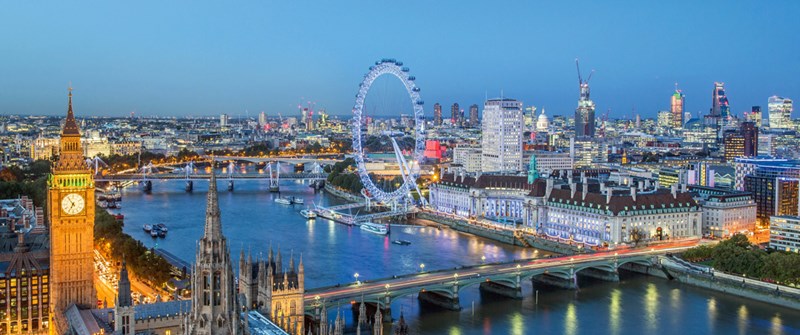
Official city guide to London, England: Visit London.
London is the capital and most populous city of England and the United Kingdom. Standing on the River Thames in the south east of the island of Great Britain, London has been a major settlement for two millennia.
Below you will find important information about London which can help you planned your trip or may be useful to you in an emergency or at any time during your visit.
London Weather
The weather for London in October is a fairly cool time to visit, when the autumn season is well underway. During this month, the average temperature is 12°C which slowly changes as the month develops. With an average of 71mm of rainfall, October is the rainiest month in London, so make sure you pack plenty of water-proof clothing or an umbrella.
London Airports
London has five major airports in the metropolitan area: London City, London Gatwick, London Heathrow, London Luton and London Stansted. Together, they make the busiest airport system in the world by passenger numbers and the second busiest by aircraft movements. The airports serve a total of 14 domestic destinations and 396 international destinations.
Getting Around London
There are several different means of transportation in London enabling you move throughout the city with ease. You can descend into the underground and grab the subway (tube), hop on a bright red bus to see the sights, or hail one of the ubiquitous London Black Cabs. The tube is generally the fastest way to get around the city. It’s also a good idea to pick up a map of the entire Underground system so that you will be able to work out the different tube lines.
London Time Zone
In the UK the clocks go forward 1 hour at 1am on the last Sunday in March, and back 1 hour at 2am on the last Sunday in October. The period when the clocks are 1 hour ahead is called British Summer Time (BST). When the clocks go back, the UK is on Greenwich Mean Time (GMT).
London Currency
The official currency in London is the pound sterling. Credit cards, especially Visa and Mastercard, are widely accepted in London's restaurants, bars, cafés and shops. American Express and Diners Club cards are less commonly accepted. There are plenty of cash machines dotted around London. Most accept international cards with the Visa, Plus, Mastercard, Cirrus or Maestro symbols. Some other systems are also recognized, but it's a good idea to check with your bank or card company before you travel. If you have a non-UK account you will almost certainly have to pay a charge when you withdraw cash.
Language spoken in London
London is a hugely diverse city, with hundreds of languages spoken by its approximately 8 million inhabitants. The most widely used is of course English, but around 22% of residents have another mother tongue. The most common other languages you'll hear in the city are Polish, Bengali, Gujurati, French, Urdu and Arabic. The 2011 Census revealed that over 100 languages are spoken in 30 of London's 33 boroughs, meaning that this astonishing diversity is to be found right across the capital.
Tips
Tipping is appreciated but not always appropriate in London. It is customary to leave 10-15% of the bill when eating out in a restaurant however; it’s not customary to tip for fast food or takeaway meals. People generally do not tip in pubs although it's still up to you to choose to leave a tip. It is polite to tip 10-15% of the taxi fare for black cabs and licensed minicabs.
London Electricity
UK power sockets deliver an average voltage of 230v, although in practice this can be slightly higher. To charge devices that are compatible with this voltage, simply buy the appropriate adapter from the airport or from high street shops. If your device runs on a lower voltage, however, then you will also need a converter to stop it from over-heating. Even if your country uses lower voltages, remember to check whether your device is dual-voltage (look for the 110-240v notation) before buying a converter.
Emergency Services and Healthcare in London
- Call 112 or 999 for the emergency services (police, fire and ambulance) in London.
- Call 101 to report non-urgent crime to the police from within the UK.
The National Health Service (NHS) is the main healthcare provider in the UK. NHS treatment is free for UK residents. Overseas nationals are not eligible for free NHS treatment except if they need emergency treatment while in the UK. You are strongly advised to take out travel insurance to cover any medical expenses. If you come from a country that holds a UK healthcare agreement, you are entitled to free or reduced-cost medical treatment if needed immediately for a condition that started after your arrival in the UK. If you're visiting from Europe, you need to carry a valid EHIC (European Health Insurance Card) in case you need immediate and necessary medical treatment in an NHS hospital. Without this you can be charged for treatment. Travel insurance is still advisable as it offers greater flexibility over where and how you're treated, and can cover expenses not paid for by the NHS.
Find out more on the Department of Health website.
Read our guide to Staying Safe in London.